#Juriste senior
Explore tagged Tumblr posts
Text
Unbox a new phone in the US and it's almost certain to have Google as the default way to search the web. Federal judge Amit Mehta on Monday ruled in favor of the US Department of Justice that the contracts Google uses to secure that position violate fair competition laws. Now Mehta must decide what to do about it.
The jurist could order big changes to the unboxing experience, with users having to select their default search provider. He also could go as far as to force Google to sell parts of its business. Mehta scheduled a hearing for September to begin the process of deciding the penalties, but with Google appealing the verdict, it could be years—if ever—before the search giant must comply.
Though legal and economics experts say it’s difficult to guess where Mehta might land with his remedies, they have some ideas of what he might be considering. Here’s a look at five options.
Ban Revenue Sharing
US courts have generally tried to resolve antitrust violations by ordering an end to the illegal behavior, setting rules to prevent it from recurring, and taking any additional measures needed to ensure that the culprit and its competitors are moved onto an even field.
To satisfy that first prong, Mehta is widely expected to ban Google from continuing with arrangements under which it splits tens of billions of dollars in ad revenue among Apple, Samsung, Mozilla, and other companies that agree to set Google as the default search on their devices or software.
“At a minimum, the Justice Department will ask for an injunction that forbids Google from engaging in the conduct that the court deemed to be improper,” says William Kovacic, who previously served as an antitrust regulator on the US Federal Trade Commission.
An injunction might prevent Google from using its unmatched economic might to outspend smaller search companies, such as Bing, DuckDuckGo, or Ecosia, to secure exclusive default status. Positioning matters; Mehta’s ruling found that even when it’s easy for users to switch defaults, most people don’t adjust the setting. But some do prefer Google. That’s why “Google.com” is the most popular search term on Bing, which is the default on some Microsoft devices, according to Mehta’s ruling.
In the future, users who prefer Google may end up having to query “Google.com” in other search engines, too.
Require Choice Screens
Mehta could follow the lead of the European Union, which for years has required Google to offer a menu of search options on Android devices, and recently expanded the rule to the Chrome browser.
Experts don’t believe the European regulation has led to a significant increase in the popularity of Google alternatives because users recognize Google better than other options. “The horse is already out of the barn,” says Herbert Hovenkamp, an antitrust scholar at Penn Law School who has researched tech platforms. “One problem with free choice is that it won’t necessarily take down Google’s market share.”
But if Mehta pursues the approach, he should make some improvements on the EU’s rules, says Kamyl Bazbaz, senior vice president of public affairs at DuckDuckGo. Users should be prompted with the choice screen periodically, not just once, Bazbaz says. They shouldn’t have to deal with popups from Google urging them to switch the default to Google, he adds. And when users first interact with a competing search app, there should be an easy way to set it as the default app.
With these added measures, some searchers could find themselves more reliably ditching Google. Others could be frustrated by the recurring requests.
Order a Divestiture
Contract bans and choice screens are examples of conduct remedies. But the Justice Department in recent years has expressed a preference for what are known as structural remedies, or breaking off parts of a company.
Most famous is the breakup of telephone giant Bell in the 1980s, creating a variety of independent companies, including AT&T. But courts aren’t always on board. When Microsoft lost an antitrust battle in the 1990s, a federal appeals panel rejected an order to break up the company, and Microsoft eventually settled on a range of conduct changes.
A one-time sale is preferred by regulators in part because it doesn’t require them to invest in monitoring the ongoing compliance of companies in terms of conduct remedies. It’s a much cleaner break, and some antitrust experts contend that structural remedies are more effective.
The challenge is figuring out what parts of a company need to be separated. John Kwoka, an economics professor at Northeastern University who recently served as an adviser to FTC chair Lina Khan, says the key is identifying businesses in which ownership by Google are “distorting its incentives.” He says that, for instance, breaking off search could open the door to Google’s Android partnering with a different search engine.
But Hovenkamp doubts the potential of a search sell-off to increase competition because the service would remain popular. “Selling Google Search would just transfer the dominance to another firm,” he says. “I don't know what sort of breakup would work.”
Some financial analysts who study Google parent Alphabet are also skeptical. “Alphabet's scale, continued strong execution, and financial strength mitigate this legal risk and the possible ensuing financial and business model ramifications,” Emile El Nems, vice president for Moody's Ratings, said in a press statement.
Other legal experts envision a future in which search results would come from Google and the ads in the experience from another company that’s spun off from Google. It’s unclear how that remedy would affect users, but it’s possible ads could end up being less relevant and more intrusive.
Force Google to Share
Mehta found in his judgment that Google provides users a superior experience because it receives billions of more queries than any other search engine, and that data fuels improvements to the algorithms that decide which results to show for a particular query.
Rebecca Haw Allensworth, a law professor at Vanderbilt University following the Google case, says one of the most aggressive remedies would be requiring Google to share data or algorithms with its search competition so they too could improve. “Courts do not like to force sharing between rivals like that, but on the other hand, the judge seemed very concerned about how Google’s conduct has deprived its rivals of what they really need to compete—scale in search data,” she says. “Forcing data sharing would directly address that concern.”
Potential shareable data could include all the queries that users are running on Google and which results they are clicking, DuckDuckGo’s Bazbaz says.
Another option would have Google hold on to its data while instead providing a service on a nondiscriminatory basis, with adequate customer support, for other apps to pull results from Google and present them to users as part of a competing experience. Rivals have called Google’s existing offering in this regard inadequate.
“Only a multipronged remedy will allow rivals to enter the market and fairly compete for consumers based on the merits of their own product,” says Lee Hepner, senior counsel at the American Economic Liberties Project, an anti-monopoly advocacy group.
Any approach that involves Google sharing data is likely to raise questions about its users’ privacy. Strengthened rivals also would have a better shot at securing defaults, meaning those who’d rather use Google would again have to take a few more steps to get back to regular old Google.
Increase Oversight
It’s up to the Justice Department to propose to Mehta potential remedies, which Google would then get a chance to rebut. Neither side has previewed what it wants.
In some other antitrust battles, Google has found ways to design product and policy changes to continue to limit competition in part by making competing unaffordable for rivals. “Google will do anything it can to get in the way of progress,” Bazbaz says. That’s why he hopes Mehta establishes a monitoring body to administer the remedies and hold Google to their spirit.
Bazbaz also wants to see Google have to invest in public education initiatives to let users know about the benefits they can get from switching search engines. With oversight and PR measures in place, users may have no choice but to hear about the Google Search antitrust case for a long time to come.
40 notes
·
View notes
Text
Hafiz Ibn Kathir (رحمه الله) has cited this as the statement of the senior Tabi’i, Imam Mujahid ibn Jabr (رحمه الله).
Mujahid (رحمه الله) said:
“The true jurist is the one who fears Allah, even if his knowledge is limited, whereas the true ignoramus is one who disobeys Allah despite possessing abundant knowledge.”
[Al Bidayah wan Nihayah, vol. 10, pg. 54]
13 notes
·
View notes
Text

Jurist Ketanji Onyika Brown Jackson (September 14, 1970) serves as an associate justice of the SCOTUS. She was nominated to the Supreme Court by President Joe Biden and sworn into office on June 30, 2022. She was a US circuit judge of the US Court of Appeals for the District of Columbia Circuit.
She was born in DC. Her father, Johnny Brown, further attended the University of Miami School of Law and became the chief attorney for the Miami-Dade County School Board; her mother, Ellery, served as school principal at New World School of the Arts in Miami.
She studied government at Harvard University. She performed improv comedy took classes in drama and led protests against a student who displayed a Confederate flag from his dorm window. She graduated from Harvard with an AB magna cum laude. Her senior thesis was entitled “The Hand of Oppression: Plea Bargaining Processes and the Coercion of Criminal Defendants”.
She worked as a staff reporter and researcher for Time magazine, then attended Harvard Law School, where she was a supervising editor of the Harvard Law Review. She graduated with a JD cum laude.
She is a member of the Judicial Conference Committee on Defender Services and the Council of the American Law Institute. She serves on the board of Georgetown Day School and the Supreme Court Fellows Commission.
She has served as a judge in several mock trials with the Shakespeare Theatre Company. She presided over a mock trial, hosted by Drexel University’s Thomas R. Kline School of Law, “to determine if Vice President Aaron Burr was guilty of murdering” Alexander Hamilton.
She has served as a judge for the Historical Society of the District of Columbia’s Mock Court Program. She served on the advisory board of Montrose Christian School, a Baptist school.
She presented at the University of Georgia School of Law’s 35th Edith House Lecture. She gave the Martin Luther King Jr. Day Lecture at the University of Michigan Law School and was honored at the University of Chicago Law School’s third annual Judge James B. Parsons Legacy Dinner, which was hosted by the school’s Black Law Students Association. #africanhistory365 #africanexcellence #deltasigmatheta
5 notes
·
View notes
Text
Speakers and hosts agreed that instead of regulating the practice of surrogacy, which would only create demand, efforts should be made to highlight that surrogacy means, in essence, the commodification of children who become objects of surrogacy agreements, which is a deep violation of their human dignity.“
The European Christian Political Movement together with the offices of Members of the European parliament Bert Jan Ruissen (ECR) and Miriam Lexmann (EPP) organized on 23 May a conference on parenthood policies in the European Union, with a focus on the issue of surrogacy.
The two keynote speakers invited to provide expertise on the matter were Adina Portaru, Senior Counsel for the faith-based legal advocacy organization ADF International and Olivia Sarton, the scientific director of the French children’s rights organization Juristes Pour l’Enfance (Lawyers for Childhood).
The conference came as a response to the European Commission’s recent proposal for a EU-certificate of parenthood which is currently being debated in the European Parliament. This initiative would put pressure on member state governments to sanction surrogacy even though a country may not allow the practice.
It also comes as a contradiction to what the Commission has repeatedly said on various occasions: that the European institutions do not have competenceover issues like family, marriage, parenting, etc.
The hosts suggested that surrogacy fuels abuse, human trafficking, violating the rights of vulnerable women and children, in essence violating human dignity. The practice commodifies both children and women’s wombs, which is unacceptabl, they said.
Olivia Sarton underlined that surrogacy is a new form of exploitation that takes advantage of the bodies of women and appropriates the children they bear. She added that the conditions under which many women consent to the practice (state of need and psychological fragility) cast doubt on whether they freely gave their consent. She also made reference to the Casablanca Declaration, which calls for the universal abolition of surrogacy.
According to Portaru, the above-mentioned proposal of the European Commission puts into practice a very specific objective that the EU has pursued and promoted in the past years, captured in the slogan: “If you are parent in one country, you are parent in every country”. For her, this means that “if one EU country recognizes, for example, a US judgment which recognizes parenthood emanating from a surrogate agreement, that relationship or birth certificate will have to be recognized throughout the EU. Therefore, de facto, all kinds of surrogacy will be allowed and justified through the proposed regulation”.
Speakers and hosts agreed that instead of regulating the practice of surrogacy, which would only create demand, efforts should be made to highlight that surrogacy means, in essence, the commodification of children who become objects of surrogacy agreements, which is a deep violation of their human dignity.
#Europe#european union#Juristes Pour l’Enfance (Lawyers for Childhood)#The European Christian Political Movement#Anti surrogacy sunday#surrogacy exploits women#Babies are not commodities#no one is entitled to biological children#Casablanca declaration
66 notes
·
View notes
Text

The Islamic Fatwa Council has issued a fatwa explicitly banning Hamas and supporting the rights of Palestinians that are being violated in Gaza.
The first of its kind, the fatwa condemns Hamas and blames it directly for the violations and oppression in Gaza.
The fatwa forbids joining or praying for Hamas, as well as funding or fighting for it. It judges Hamas unequivocally responsible for its own corrupt rule and affirms that the Muslim Brotherhood in all its branches is a terror organization violating the tenets of the Islamic faith.
The fatwa, released recently, was issued by three renowned Muslim jurists from Iraq and Pakistan, led by Grand Ayatollah Fadhel al-Budairi; Sheikh Abdallah al-Dheeban, the Sunni Grand Mufti of Wasit Governorate; and Pakistan's Peer Syed Mudassir Nazar Shah, from the International Sufi Council.
We have seen what Gaza is subjected to under Hamas's rule, and the atrocities, in our view, which it has perpetrated against Palestinians faithful, unarmed [civilians] who have neither strength nor recourse. And so we believed it was our Islamic obligation to aid the oppressed. Our faith, in its wisdom, enjoins us to be "an enemy to the oppressor and an aid to the oppressed." That is why the fatwa was issued against Hamas. -- Sheikh Muhammad Ali al-Maqdisi, Spokesman for the Islamic Fatwa Council
The Islamic authority Grand Ayatollah al-Budairi stressed that no one is beyond blame for the harm done to the Palestinian people - even those who think of themselves as "leaders" claiming to represent the Palestinians.
We, as an Islamic authority, stand with the oppressed Palestinian people, and we do not accept that any harm be done to them, whether by Israel or Palestinian governing elements, be they from Hamas or others. These officials are supposed to bear responsibility to protect the Palestinian people. -- Grand Ayatollah Fadhil al-Budairi, Chairman, Islamic Fatwa Council
Fatwa Council spokesman Muhammad Ali al-Maqdisi, a scholar and lecturer at the Islamic seminary in Najaf, explained in an interview with the French magazine L'Obs that one of the motivations for issuing this fatwa was the suffering of the people of Gaza as exposed in the video series "Whispered in Gaza."
When these videos appeared, nearly everyone who follows Palestinian affairs saw them. I'm referring to the series "Whispered in Gaza." In these videos, numerous inhabitants of Gaza - men, women and children - describe what they've been subjected to because of Hamas's corruption. They testified before the world to the many forms of extortion and intimidation they've suffered. Every human being should heed this testimony. As complaints about Hamas's behavior toward the unarmed and poor Palestinian people increased, this gave us the impetus and clarity to issue a fatwa against Hamas. -- Sheikh Muhammad Ali al-Maqdisi, Spokesman for the Islamic Fatwa Council
Beyond reflecting a religious view or position, the fatwa heralds a new, courageous approach calling on other fatwa councils, institutions and leaders in the Islamic world to reinforce the fatwa - and build on its accompanying juridical findings as well as Shari'ah and Islamic law overall.
We expect that society writ large will support the oppressed in Gaza. We believe that all Muslim clerics who adhere to their true responsibilities must take the same position. This is what we believe. -- Sheikh Muhammad Ali al-Maqdisi, Spokesman for the Islamic Fatwa Council
The fatwa is in accord with Islamic organizations in the Arab Gulf - including the UAE Fatwa Council and the Council of Senior Scholars in Saudi Arabia - which have designated the Muslim Brotherhood in all its branches a terror organization.
Of note, Sheikh al-Budairi met with Sheikh Dr. Mohammad al-Issa, Secretary General of the Muslim World League, in Mecca at the beginning of this year - an indication that the views of the two organizations and their leaders are aligning.
--
The Fatwa (English version):

--
More:
#Whispered in Gaza#gaza#Gaza Strip#Hamas#palestine#free gaza from hamas#free gaza#free palestine from hamas#exterminate hamas#islamic terrorism#fatwa#Islamic Fatwa Council#islam#terrorist organization#fatwa against hamas#human rights violations#religion is a mental illness
10 notes
·
View notes
Text
Lisa Needham at Public Notice:
It was likely only a matter of time before right-wing federal judges decided to weigh in on student protests over the ongoing slaughter of Palestinians. And, these judges being the reactionaries they are, their contribution to the discourse is not designed to provide solutions or even to advance a coherent worldview. Instead, it’s just some good old-fashioned hippie-punching. On Monday, 13 federal judges, led by Trump appointees James Ho of the Fifth Circuit Court of Appeals and Lisa Branch of the Eleventh Circuit, sent a letter to the president of Columbia University, Minouche Shafik. They stated they would no longer hire as law clerks anyone who attends Columbia University — the undergraduate and the law school — starting with the entering class of 2024.
This isn’t the first time Ho and Branch have pulled this stunt. In the fall of 2022, they both declared they would no longer hire law clerks from Yale Law School after students disrupted speeches by right-wing speakers. In March 2023, they extended their boycott to Stanford after students heckled fellow Trump appointee Judge Kyle Duncan. This time around, they’re joined in the letter to Columbia by 11 other Trump-appointed judges (Alan Albright, David Counts, James W. Hendrix, Matthew J. Kacsmaryk, Jeremy D. Kernodle, Tilman E. Self III, Matthew H. Solomson, Brantley Starr, Drew B. Tipton, Daniel M. Traynor, and Stephen Alexander Vaden). The esteemed jurists have three demands for Columbia — but they don’t provide any facts, context, or legal reasoning to underpin them. At only two pages, this is a thin little screed, particularly given that fully one-third of a page is just the list of the judges’ names.
[...]
Quixotically, the people who will be most hurt by this are conservative students. The progressive students out protesting right now don’t want to clerk for judges like this. Right-wing students who might have contemplated attending Columbia will presumably go elsewhere, meaning the viewpoint diversity the judges demand won’t happen either. When Judge Ho announced his Yale clerk boycott, a Yale student asked him exactly this: “How will we fix the culture of students … if all of the conservatives suddenly boycott Yale with the judges?” Ho didn’t have an answer, instead saying that “if someone has a better idea, I am all ears” and that “the objective is very simple, it’s to restore free speech.” These judges are only part of the current right-wing project to redefine free speech and tolerance as the absence of diversity. They’re joined by people like New York Republican Rep. Elise Stefanik, who has pushed the “great replacement theory” that Democrats are importing millions of undocumented immigrants to replace white voters. This is a theory endorsed by the marchers at Charlottesville and grounded in the antisemitic belief that Jews are behind the plan. These days, Stefanik is a self-styled protector of Jewish students, holding hearings to harangue university administrators over their ostensibly antisemitic behavior and celebrating when she gets them fired.
There’s also Christopher Rufo, who has helped with everything from destroying Florida’s public university system to ousting former Harvard president Claudine Gay. There’s former Trump senior advisor Stephen Miller, whose “America First Legal” law firm exists largely to file lawsuits to block any government initiative that attempts to redress historical wrongs against people of color. And there are any number of feckless state legislators who are eradicating all diversity initiatives in their states. At root, this is a profoundly cynical enterprise. None of this is borne out of concern for Jewish students. Rather, they serve as a convenient prop for the latest iteration of MAGA bombast. None of these people will ever confront the antisemitism at the core of their party and that Trump, their presumptive presidential nominee, has a decades-long history of stoking. These judges will continue to use their lifetime appointments to roll back rights for everyone they don’t like and they will continue to demand that schools show them fealty. Meanwhile, the students they loathe will continue to risk their safety and their future by standing in solidarity with people thousands of miles away. The kids, as they say, are alright.
13 right-wing judicial activists serving on various federal courts sent a letter to Columbia University’s scandal-tarred President Minouche Shafik that they will not hire any Columbia attender for law clerk positions in the future as part of the overblown right-wing moral panic about antisemitism on college campuses.
#Judiciary#Columbia University#Campus Protests#Israel/Hamas War#Judicial Nominations#Courts#Lisa Branch#James Ho#Judicial Activism#Elise Stefanik#Christopher F. Rufo#Minouche Shafik
3 notes
·
View notes
Text

Theoriemosaik, mosaisch, musisch
1.
Theoriemosaik ist ein Titel, den Marietta Auer gewählt hat. So ein Titel dient unter anderem dazu, Projekte zusammenzubringen, also Wissenschaftlerinnen und Wissenschaftler anzulocken, ihnen Raum und Zeit zu geben, um an der Forschung der Abteilung und des Institutes aktiv und passioniert teilzunehmen. Das Institut befasst sich mit Rechtsgeschichte und Rechtstheorie. Auers Abteilung fokussiert Theorie und legt den Schwerpunkt auf das Privatrecht.
Am Privatrecht interessieren die Grundlagen, die Theorie und der Vergleich. Eine Schlüssselvorstellung am Institut lautet MultiPliCity, die Auer als Multidisziplinarität fokussiert. Theoriemosaik gibt dem Programm einen dichten Titel, also mehrfach deutbaren Titel. Man kann den Titel wörtlich verstehen, bildlich, abstrakt und konkret. Solche Titel haben auch eine werbende Funktion, das heißt aber nicht, dass sie rein äußerlich sind, sie sollen auch wirbeln und Wind machen, den Mitarbeiten den Kopf durchpusten. Sie sind auch Programm und Teil einer wissenschaftlichen Poetik oder Poiesis, die Forschung strukturiert, zum Beispiel Forschungsgegenstände konturiert und Verfahren austreiben lässt.
Ein Titel wie Theoriemosaik mag heteropoietisch klingen, nicht autopoietisch, er ist nicht unbedingt selbsterklärend oder selbstverständlich. Gut so, denn er soll Forschung initieren, die mit Multiplizität zu tun hat. Versteht man Theoriemosaik wörtlich, ist es einfach, die Bodenmosaik aus der Hafenstadt Otranto (s.o.) auch als Theoriemosaik zu verstehen. Diese Mosaik ist Grund und Einrichtung im Süden, hier ist sie ein Beispiel. Nicht ganz so schnell mögen rechtliche, privatrechtliche Fragen auftauchen. Ein berühmter Jurist (der auch über Kausalität im Süden geschrieben hat) hat zwar über diese Mosaik in Otranto etwas geschrieben, aber der soll erstens Verwaltungsjurist, zweiten Gesellschaftstheoretiker, drittens Systemtheoretiker sein, und er schreibt über diese Theoriemosaik in einem Buch über die Kunst der Gesellschaft, aber doch nicht in dem Buch über das Recht der Gesellschaft. Wenn jemandem sicher wäre, dass das nichts mit Privatrecht zu tun hat, dann wird unsere Forschung eventuell nicht verlockend erscheinen.
Wenn man davon ausgeht, dass Grundlagen des Rechts und Theorie und Vergleich doch keine Begriffe wären, die man wörtlich nehmen müsse, sondern dass es nur und nichts als Metaphern wären und darum Grundlagen nichts mit Architektur, städtischem Raum, Vielzweckhallen und Messehallen, mit entfernten Bodenstrukturen und Einrichtungen im Süden zu tun habe, dass Theorie nur eine Metapher ist, die weder mit göttlicher oder auch nur hoch distanzierter Wahrnehmung oder Supervision/ Überblick zu tun hat, dass Vergleich doch nur eine Metapher ist und man das nicht wirklich als Auseinandersetzung mit unterschiedlichem Wissen, unterschiedlicher Wissenschaft und unterschiedlichen Verfahren zu verstehen hat (der Vergleich also auch nichts Ungleiches in den Blick nimmt und das tertium comparationis, der Dritte also immer schon feststeht), dann fällt einem vielleicht schwer, zu verstehen, warum Marietta Auer diesen Titel gewählt hat. Wenn man aber in allem dem Unsicherheiten, Neugierde und Klärungsbedarf erkennt, könnte der Begriff Theoriemosaik verlockend sein.
2.
Marietta Auers Arbeitsweise kommt aus dem Privatrecht, nicht aus dem öffentlichen Recht. Das fällt mir an einem Punkt schnell auf: Solche Titel wählt sie, weil sie von der Abteilung auch erwartet, dass niemand seine Interpretation des Titels von der Autorisierung durch Marietta Auer abhängig macht. Sie verträgt viele Begriffe und will sie nicht unbedingt regieren. Das kenne ich doch teilweise auch anders, man trifft sonst auch Typen, die Interpretation nur als autorisierte Interpretation akzeptieren.
Was ist meine Aufgabe? Ich bin als senior researcher einer der Schäferhunde, also ein pastoral-kynisch tickender (insoweit besonders dogmatischer) Gefährte (im Sinne von Donna Haraway) der Theoriemosaik. Die Schäfchen, also die betreut werden sollen und betreut werden wollen, die betreue ich bei Bedarf mit, dann laufend, kreisend und lärmend. Mir kommt der Titel Theoriemosaik gelegen, nicht nur, weil mein Forschungsschwerpunkt die Bild- und Rechtswissenschaft ist und ich die Mosaik für eine fantastische Konstellation aus Mosaischem und Musischem halte. Theoriemosaik ist nämlich eine scharfe und wohl überlegte Figur, die Ungewissheit, Neugierde und Klärungsbedarf sehr spezifisch strukturiert.
3.
Die Mosaik deute ich zuerst mosaisch. Eine Mosaik lässt also wahnehmen, was man auch Tafel und Gesetz nennt. Sie ist auch eine Gesetzestafel. Sie ist dazu noch musisch, lässt also auch wahrnehmen, was an den Informationen über Tafeln und Gesetze auch rauscht, singt, trinkt, isst/frisst oder reigt, dazu später mehr.
Das Mosaische ist eine Angelegenheit höherer und höchster Wesen. Von höheren und höchsten Wesen wurde gedacht, dass erstens die Menschen ihr Ebenbild und sie wiederum anthropomorph oder anthropobolisch seien. Zweitens wurde von höheres und höchsten Wesen gedacht, dass ein höchstes Wesen ein einziges und einzelnes , dass dieses höchste Wesen zwar eins sei, aber dreifaltig, also in kleiner Anzahl multiple (die drei ist eine kleine Zahl) sei.
Wurde überall so gedacht? Im zuletzt an diesem Institut sogenannten Europa wurde das bestritten, also gehändelt und verhandelt. Gemeint war mit Europa nicht einfach das, was innerhalb des Umrisses einer kontinentalen und zerklüfteten Landspitze zu einer Ansammlung von Nationalstaaten wurde. In einem historisch und theoretisch anspruchsvollen Sinne was Europa Teil des "Mittelmeerbeckens" (Warburg), des Schwarzen Meers, sogar des Kaspischen Meers und des Atlantiks. Europa war Land und See, Troja liegt da, und Moses, der Ägypter, der taucht dort auf. Derrida hat darauf hingewiesen, dass dieses Europa zwar im Westen an einem Kap scharf konturiert endet, dort aber eine Schleuse sich öffnet, die mit dem Titel Plus Ultra versehen ist. Im Osten wiederum franst dieses Europa aus, was vermutlich die Vorstellung genährt hat, die im Osten würden übertreiben, während die im Westen sparsamer und begrifflich tugendhafter und asketischer wären.
Otranto ist ein Beispiel, Otranto ist eine Hafenstadt. Die Theoriemosaik, die dort in einer ehemaligen Vielzweckarchitektur, einer Messehalle (einer Basilika) entworfen wird, mag in Europa vertraut sein, kommt aber weit aus dem Osten, aus Gebieten, die man auch Kleinasien oder naher Osten nennt, teilweise ist umstritten wie man sie nennt. Es gibt sogar Versuche, die Benennung strafrechtlich zu ahnen. Man dürfe sagen, dass die Gegend frei sein soll, aber dann dürfe man sie nicht Palästina nennen sondern müsse sie Israel nennen. Theoriemosaik ist Theoriemosaik, durchaus mit bildungsbürgerlichem Zitatenschatz, aber mit rechtlichen und teils sogar tödlichen Konsequenzen in der Gegenwart. Soweit zum Mosaischen von Theoremosaik. Wir forschen zum Multiplen, nicht weil wir denken, dass nichts mehr Mono läuft, ganz im Gegenteil. Die Welt ist nicht fragmentiert, nicht auseinandergebrochen, die Trennungen zur Vergangenheit oder die zum Osten wurden nicht unbedingt größer. Die Welt hat kontrahiert und distrahiert, sie kontrahiert und distrahiert auch weiter. Die Abstände zur Vergangenheit und zum Osten werden dabei mal größer gemacht, mal kleiner. Multiplizität ist ein Vorgang, der sich zwar auf die Seite der Vermehrung schlagen kann, aber auch auf die Seite der Verminderung. Damit sind wir auch beim zweiten Aspekt einer Theoriemosaik, nämlich den Musen und dem Musischen.
4.
Das Musische der Mosaik deute ich musisch. Die Wesen des Musischen gelten in Zonen, zu denen Otranto seine Theoriemosaik entworfen hat, nicht unbedingt als höhere oder höchste Wesen. Musen, Sirenen, Nymphen oder Satyre gelten auch als 'adamtische' und 'evaistische', als wilde, parasitäre, situationistische (unbeständig lettristische, also weder begreifende und literale noch besonders gebildete und ideale Wesen). Die greifen und lassen sich betouchen, aber nicht begreifen. Die führen sich sogar exhibitionistisch vor,lassen sich sogar als Akt nackt anschauen, sollen darum aber auch eher ungebildet, keine Vor- oder Leitbilder und keine Ideale sein, schon gar keine "Persönlichkeitsideale" (Vesting). Musen, Nymphen, Satyre gelten als niedere Wesen. Die Sinne, die sie teilen, gelten als niedere Sinne. Wenn niedere Wesen (Minore) Recht wahrnehmen, so soll das nach Ansicht einiger Asketen etwas anderes als Nutzen sein, eher so etwas wie Trieb und Genuß.
Wenn das Mosaische höhere Epistemologie, höhere Anthropolgie und höhere Jurisprudenz befördert haben soll, dann soll das Musische minore Epistemologie, minore Anthropologie (Latour/ Viveiros/ Hage) und minore Jurisprudenz (Vismann) befördert haben. Das Musische ist dem Begehren, Verkehren, Verzehren, dem Fegen/ Werben/ Wirbeln und Querulieren, dem Rauschen, dem noise und der noiseuse, der schönen Querulantin, affin. Auf den Staatstafeln , die Aby Warburg 1929 zu den Lateranverträgen entwirft, tauchen eine Reihe solcher musischen Figuren auf, sowohl im Bild der Messe von Bolsena (dort als Querela) als auch in der Arenakapelle (dort als spes), auch in dem protestantischen, antisemitischem und antioströmischem Propagandamaterial tauchen sie auf, dort werden sie besonders niedrig gemacht.
Toujours l'amour, jeden Tag love and law, jeden Tag Wahrheit im Raum und jeden Tag war room, dabei immer auch Gesellschaft den Gesellen und Demos den Dämonen: Das Musische gibt etwas für den bürgerlichen Zitatenschatz her, aber schon darum und weit darüber hinaus ist es ein fatales, prekär drängendes Problem. Wenn wir davon ausgehen würden, dass die Leute heute schlauer, taktvoller oder harmonischer wären, was die Grundlagen, Theorie und den Vergleich von (Rechts-)Ordnungen angeht, würden wir nicht in dieser Abteilung arbeiten.
5.
Theoriemosaik ist ein Titel und eine Initiale. Der Titel übersetzt noch einmal das Programm des Institutes und das Programm der Abteilung. Will ich das auf einen Begriff bringen, der auf den ersten Blick abstrakter wirkt, ist das der Begriff Multiplicity. Weil jeden Tag viel und oft zuviel ist und weil fraglich ist, was sich gerade aus die Seite der Vermehrung schlägt, was sich auf die Seite der Verminderung schlägt, sind für mich zwei Betandteile des Begriffes die wichtigsten: Pli und City. Pli übersetze ich mit Falte - das wiederum in das, was in Bildregeln Kreuzen genannt wurde. City übersetze ich als Stelle, an der Raum zu Ort und Zeit zu Geschichte wurde.
Ino Augsberg hat den Part zum Kreuzen ausführlich kommentiert, also kommentiert, inwiefern das Interesse an Kreuzungen als Beitrag zur Geschichte und Theorie des Faltens verstanden werden kann. Er übersetzt weiter Kreuzen und Falten in den Begriff des Säumens; er übersetzt Falte auch als Kassiber. Kassiber hat mit cash, Speicher und Tresen, Bank und Bar zu tun. Damit geht etwas durch, da passiert etwas - und das wird mit Norm und Form belegt. Vom Scheiden ist ein längerer und mit langen Beispielen versehener Beitrag dazu, welche Techniken etwas trennen, assozziieren und austauschen. Für Leute, die in deutscher Rechtswissenschaft ausgebildet worden, ist das erste Beispiel zu Fritz Schulz wohl dasjenige, das am wenigsten überrascht. Später geht es in dem Text um das Kino, camera obscura und Gitterstäbe (Kassiber!), Schatten und Licht, um Tafeln und Europa als erdig-anthropomorphes Wesen mit einem Stab im Rücken, also um ein polarisiertes Wesen, das etwas spiegeln soll. Diese weiteren Beispiel könnte Leute, die sich mit der Forschung zu Recht und Kulturtechnik oder mit Vismann nur am Rande befassen, am Anfang überfordern, mache überfordert das auch heute. Bis heute weigern sich Gutachter, meine Texte in Reviewverfahren oder Bwerbungsverfahren auch nur anzuschauen, man mus mal lesen, was die Redaktion der Zeitschrift Vom Staat geschrieben hat, als ich denen noch Texte sendete. Meine Texte erscheinen "weitschweifig", das ist u.a. historisch (deutlich bei Dürer, aber auch bei Thomas Hobbes und Descartes) mit der Melancholie, der Meteorologie und der Polarität verknüpft. Aby Warburg stellt mit seinem Atlas und den Staatstafeln klar, dass das Weitschweifige die Angelegeneit des Atlas ist. Es trägt eine Welt im Rücken, also eine Welt, die im Rücken und verrücken zwar begriffen, aber nur schwer handhabbar und händelbar ist. Warburg entwirft Staatrechtslehre als private Praxis öffentlicher Dinge, genau das richtige im Kontext von Auers Interesse an einer Privatrechtstheorie öffentlicher Dinge.
Norm ist eine formierte Stelle, Form eine normierte Stelle, durch die Differenz operationalisiert wird. Norm und Form ist eine Stelle, durch die etwas getrennt, assoziiert und ausgetauscht wird. Dass Norm und Form dann auch effektiv, verbindlich oder wertvoll ist, das bestreite ich nicht. Ich möchte aber nicht einen analytischen Diskurs widerlegen und sagen, andere würde falsch verstehen, was eine Norm sei. Ich will auch nicht unterstellen, was wir darunter verstehen würden. Meine Theorie ist nicht allgemein, sie ist multiple, also perspektivisch und relativ. Ich richte Perspektiven ein, meine Arbeit ist technisch und darin ästhetische Praxis, deren Name nunmal Theorie wurde.
Marietta Auers Theoriemosaik ist ein Ort in Deutschland , wo meine Forschung geduldig und großzügig gefördert statt verhindert wird. Davon gibt es mehrere, so viele nicht. Viele Orte braucht man nicht, einer, ein einziger reicht. Viele Leser braucht man nicht, ein einziger reicht. Viele Kollegen braucht man nicht, ein einziger reicht. Ist nur einmal etwas verdoppelt und gespalten, dann ist alles möglich. Man muss nur an einem Detail etwas teilen und hat dann schon mehr, als man je verdienen könnte. Außerhalb Deutschlands sieht die Situation ohnehin anders aus, aber das leidige Thema kennen wir alle, hat ja auch Vorteile: So komme ich öfters mal rum.
3 notes
·
View notes
Text
Trump Gagged? No Way! - 04/03/2024
The New York supreme court judge Juan Merchan in Trump's "hush money" case has expanded on his earlier gag order which tried to restrict what Trump could publicly say about the case. The order came late yesterday which gags the former president from speaking in public about Manhattan D.A. Alvin Brag's family members and all others named including jurors, potential jurors, counsel, court staff, witnesses, and their families. The judge wrote, “This pattern of attacking family members of presiding jurists and attorneys assigned to his cases serves no legitimate purpose, it merely injects fear in those assigned or called to participate in the proceedings that not only they, but their family members as well, are ‘fair game,’ for Defendant’s vitriol.” He further wrote that courts are "understandably concerned" on restricting defendants' free speech, especially for those who are publicly notable. He further wrote, “The circumstances of the instant matter, however, are different. The conventional ‘David vs. Goliath’ roles are no longer in play as demonstrated by the singular power defendant’s words have on countless others.” In his ruling arguments he cited from the prosecution, “multiple potential witnesses have already raised grave concerns [...] about their own safety and that of their family members should they appear as witnesses against the defendant.” On those fears he wrote that they would "undoubtedly interfere" with the proceedings, and he continued. “The average observer, must now, after hearing defendant’s recent attacks, draw the conclusion that if they become involved in these proceedings, even tangentially, they should worry not only for themselves, but for their loved ones as well.” State prosecutor Matthew Colangelo wrote, “Defendant’s dangerous, violent, and reprehensible rhetoric fundamentally threatens the integrity of these proceedings and is intended to intimidate witnesses and trial participants alike—including this Court.” The state attorney's office was referencing Trump's remarks about the judge's daughter.
This judge, Juan Merchan, is compromised with a serious case of Trump Derangement Syndrome, and Trump's lawyers think he should recuse himself from the case because his daughter, Loren Merchan who owns a Democrat political consulting firm, heavily profited from her fundraisers dedicated to hurt and remove Trump from the political scene. The judge's wife, Lara Merchan, used to work for New York Attorney General Letitia James, who prosecuted Trump for a victimless crime of "over valuating" his property to get a more favorable loan, and to which he paid back fully with interest that made Duetsche Bank (no complaints) a lot of money. Another ridiculous, unconstitutionally brought case, which, like all the others, is nothing more than political persecution. Judge Juan Merchan's profile picture on X was of Donald Trump behind bars. I think it's fair to say that this judge is compromised, or as Trump would say, "by a lot!"
Of course, the mainstream media's talking point's echoe-chamber put out that Trump made threatening remarks about the judge's daughter, when in fact he did no such thing. One of his Truth Social posts reads, “Judge Juan Merchan, a very distinguished looking man, is nevertheless a true and certified Trump Hater who suffers from a very serious case of Trump Derangement Syndrome. In other words, he hates me! His daughter is a senior executive at a Super Liberal Democrat firm that works for Adam ‘Shifty’ Schiff, the Democrat National Committee, Senate Majority PAC, and even Crooked Joe Biden.”
As I have said before, I think all of these cases against Trump should be dismissed and thrown out, as they are obviously political witch hunts directed by Biden's crooked administration and their weaponized justice department. So, Trump appropriately calls them the "Biden trials." The left thinks they can stop him from coming back to DC, and this judge thinks he can silence him, to keep him from pointing out all of the obvious corruption in that's clearly in plain sight for anyone with a functioning brain to see; --No Way! No Way! - will they ever silence or stop him, and No Way! - will they ever silence or stop us, we the people. Trump is right when he declares these trials as being "election interference," and that they should never, ever take place in the United States of America: abso-futting-lutely; -- No Way!
#donald trump#former president#trump#biden administration#crooked joe biden#juan merchan#new york#supreme court#weaponized justice department#democrat national committee#dc#judge#trump derangement syndrome#no way#corruption#political#witch hunt#election interference#biden trials#united states#america#adam schiff#shifty schiff#matthew colangelo#state prosecutor#trump trials#senate majority pac#super liberal democrat firm#political consultant#firm
2 notes
·
View notes
Text
A group of German civil servants have written to Chancellor Olaf Scholz and other senior ministers calling on the government to “cease arm deliveries to the Israeli government with immediate effect”.
“Israel is committing crimes in Gaza that are in clear contradiction to international law and thus to the Constitution, which we are bound to as federal civil servants and public employees”, the statement says, citing the International Court of Justice’s ruling in January that Israel’s military actions are “plausible acts of genocide”.
According to the organisers of the five-page statement, around 600 civil servants have voiced support for the initiative[...]
The statement also requested that the German government pressure Israel for an immediate ceasefire in the Gaza Strip; that it renew payments to the United Nations Relief and Works Agency for Palestine Refugees (UNRWA); and that it “actively and resolutely advocates for the recognition of a Palestinian state” within the internationally recognised 1967 borders.
In 2023, Germany approved arms exports to Israel worth 326.5 million euros ($354m), a tenfold increase compared to the previous year, providing 30 percent of the Israeli military’s weapons, according to data from the Stockholm International Peace Research Institute. [...]
The civil servants sent the statement via email to ministries last week, with the disclaimer that “due to the sensitive content and the excessive state repression that criticism in this area is met with, we want to remain anonymous”. [...]
Signees reportedly include a wide range of civil servants from across different ministries, skewing towards younger women and people with international experience or biographies “outside of the German bubble”. [...]
The group will publish the statement on social networking site LinkedIn on April 8, when Germany will be defending itself at the Hague against charges brought by Nicaragua that Germany’s support for Israel violates the Genocide Convention. [...]
[One] initiator of the German civil servants’ statement, a trained jurist, expressed fear not just of losing employment for being involved in the statement, but of prosecution and even imprisonment, citing the “utterly lawless situation” in the country post-October 7 where people are arrested, sometimes brutally, with spurious legal justifications. “There are no rights in Germany at the moment when it comes to Palestine,” the initiator said.
“We wrote this letter because …. this scale of destruction and violence, the atrocities we are seeing are unprecedented in recent times. This is a huge threat to all of our democratic systems if we justify killing thousands of children,” the initiator said, adding that senior ministers were creating a “collective governmental gaslighting of what we are seeing on the ground”.
Germany’s foreign ministry did not respond immediately to a request for comment.
1 note
·
View note
Text
the first article has been deleted:
https://www.france24.com/en/video/20250321-israel-feels-like-it-s-on-the-brink-of-a-civil-war


999 notes
·
View notes
Text
Iranian President Ebrahim Raisi died on Sunday when a helicopter carrying him and a delegation of other Iranian officials crash-landed in the mountains of northern Iran, throwing the future of the country and the region into further doubt.
Foreign Minister Hossein Amir-Abdollahian and other top officials were also killed in the crash as the group was traveling in Iran’s East Azerbaijan province, the Iranian state-run Islamic Republic News Agency confirmed. Dense fog impeded search and rescue operations for hours before the crash site was found. The fog was so thick that it forced the Iranians to call on the support of European Union satellites to help locate the helicopter.
Raisi’s death puts a coda on a short but transformative era in Iranian politics that saw the country lurch in a hard-line direction and threatened to bring the Middle East to the brink of regional war. In nearly three years in power, Raisi moved Iran’s domestic politics and social policy in a more conservative direction and pushed the country further into the role of clear U.S. antagonist in the region after his predecessor, Hassan Rouhani—who defeated him in the 2017 presidential election—first sought a detente with the West over Iran’s nuclear program before stepping up proxy attacks.
An Islamic jurist noted for his close relationship with Ayatollah Ali Khamenei and considered by many officials and experts as a likely candidate to succeed the aging supreme leader, Raisi’s tenure saw Iran speed up uranium enrichment and slow down negotiations on the Joint Comprehensive Plan of Action after the United States exited the deal in 2018, three years before he came into office.
Iran under Raisi also supported Russia in its war against Ukraine with extensive exports of Shahed suicide drones and artillery; increased attacks by regional proxy militias against the United States and Israel after Hamas’s October 2023 cross-border attack on Israel; and just a month before his death launched a massive drone and missile attack against Israel.
Experts say that regardless of who replaces Raisi, the strategy he pursued is unlikely to change, having been solidified among the higher echelons of Iran’s political and clerical leadership.
“With Raisi, without Raisi, the regime is quite content with the way the post-Oct. 7 Middle East has been shaking out,” said Behnam Ben Taleblu, a senior fellow focused on Iran at the Foundation for Defense of Democracies (FDD). “It’s been able to continue its death-by-a-thousand-cuts strategy, firing directly against the U.S. and Israel via proxy and then even directly a few times itself with the tit-for-tat you saw in April, and still look like it won the round.”
Under the Iranian Constitution, First Vice President Mohammad Mokhber is likely to fill in as head of the cabinet for the next 50 days until elections can be called. Recent parliamentary elections drew record-low turnouts, analysts said. What’s more, significant effort was expended by Khamenei and his allies to ensure Raisi’s win during the last presidential election in 2021, disqualifying potential rivals.
Before becoming president, Raisi served on Iran’s prosecution committee that was responsible for executing an estimated 5,000 dissidents in 1988. He had been accused of crimes against humanity by the United Nations and was sanctioned by the U.S. Treasury Department. And that heavy-handed approach continued with the death of 22-year-old Mahsa Amini in the custody of Iran’s morality police in September 2022 after allegedly not wearing a hijab properly in public, which sparked nationwide protests.
Beyond the horizon of snap elections and the presidential election set for next year, there is potential for upheaval at the top of Iran’s ruling class. With a short line of possible successors to the 85-year-old Khamenei, other than the head of state’s son, Mojtaba Khamenei, Raisi’s death could throw the country’s political future into further turmoil.
The Islamic Revolutionary Guard Corps (IRGC), the largest branch of the Iranian armed forces that controls major swaths of the country’s economy, could also use the upheaval to strengthen its hand.
“There is no heir apparent if he’s gone,” said David Des Roches, a professor at the National Defense University’s Near East South Asia Center for Strategic Studies and retired U.S. Army colonel. “What’s really interesting is to see if the IRGC will basically complete a slow-motion coup.”
As rescue workers searched for Raisi’s downed helicopter, state media asked the Iranian people to pray for him. Instead, in the wake of reports of the crash, some Iranians appeared to light celebratory fireworks, cheering the demise of the hard-line leader.
“Today’s crash & likely death of president Raisi and his [foreign minister] will shake up Iranian politics,” Afshon Ostovar, an associate professor at the Naval Postgraduate School and a longtime Iran expert, wrote in a post on X before the president’s death had been confirmed. “Regardless of the cause, perceptions of foul play will be rife within the regime. Ambitious elements may press for advantage, compelling reactions from other parts of the regime. Buckle up.”
While experts said it was unlikely that a liberalizing figure would emerge in either snap elections or Iran’s 2025 presidential election, Raisi’s death could leave a small opening for resurgent protest movements that have persisted under the surface.
“These movements are not dead,” said Ben Taleblu, the FDD expert. “They operate on the low level, on the periphery—usually strikes, labor unions, that kind of thing. It could lead to a nationwide trigger, and it could be a nothing burger. But the story of the Iranian protest movement is always a matter of when and not if.”
28 notes
·
View notes
Text
Federal judges push back on calls for impeaching jurists who rule against Trump
Source: CNN
Federal judges push back on calls for impeaching jurists who rule against Trump
Source: CNN
Maybe because it's illegal? 🙄
1 note
·
View note
Text
Constance Baker Motley
My dad is reading a new biography on Constance Baker Motley so thought it appropriate to post about her today.
Prompt: Please respond as an expert in African American History, Constitutional law, and Civil Rights in America. Please write a short biography on the life and work of Constance Baker Motley. Then I would like you to write two pieces of work in the style of Constance Baker Motley's writing and judicial opinions. After the biography, please write an essay in her writing style and opinions on the new Administrations Executive Orders. Then can you take the most constitutionaly questionable executive order and write an opinion by her overturning the Executive Order - please refer to case law and precedent to back up the opinion.
Then I want 5 books for further reading, 5 youtube links for watching more about her life and connected topics, 5 prompts for someone to do more research on their own on Constance Baker Motley's life and work, 3 prompts for images to be created in midjourney to go along with this post and social media hashtags to go along with post.
Biography of Constance Baker Motley
Constance Baker Motley (1921–2005) was a trailblazing African American jurist, legislator, and civil rights advocate whose legal acumen and unwavering commitment to justice significantly advanced the civil rights movement in the United States. Born on September 14, 1921, in New Haven, Connecticut, she was the ninth of twelve children to parents who had emigrated from the Caribbean island of Nevis. Despite financial constraints, Motley's academic excellence and dedication to civil rights caught the attention of local philanthropist Clarence W. Blakeslee, who funded her education. She earned a Bachelor of Arts in economics from New York University in 1943 and a Bachelor of Laws from Columbia Law School in 1946.
Upon graduating from law school, Motley joined the NAACP Legal Defense and Educational Fund as a staff attorney, becoming the first African American woman to hold such a position. Under the mentorship of Thurgood Marshall, she played a pivotal role in numerous landmark civil rights cases. Notably, she was instrumental in drafting the complaint for Brown v. Board of Education (1954), the seminal case that declared racial segregation in public schools unconstitutional. Throughout her career, Motley argued ten cases before the U.S. Supreme Court, securing victories in nine, including the successful representation of James Meredith in his effort to desegregate the University of Mississippi in 1962.
Motley's commitment to public service extended beyond the courtroom. In 1964, she became the first African American woman elected to the New York State Senate. The following year, she broke another barrier by becoming the first woman to serve as President of the Borough of Manhattan. Her political tenure was marked by efforts to revitalize urban communities and improve housing and education for underserved populations.
In 1966, President Lyndon B. Johnson appointed Motley to the U.S. District Court for the Southern District of New York, making her the first African American woman to serve as a federal judge. She later became the court's chief judge in 1982 and assumed senior status in 1986, continuing to serve until her death in 2005. Judge Motley's judicial career was distinguished by her steadfast dedication to upholding civil rights and equality under the law.
Essay: Reflections on Recent Executive Orders
In recent weeks, the administration has promulgated a series of executive orders that warrant rigorous scrutiny under the Constitution's guarantees of equal protection and due process. As a jurist committed to the principles enshrined in our Constitution, it is imperative to assess these directives through the lens of established legal precedents and the enduring quest for justice.
The rescission of policies aimed at promoting diversity, equity, and inclusion raises profound concerns. The Supreme Court, in Brown v. Board of Education (1954), unequivocally stated that "separate educational facilities are inherently unequal." This landmark decision underscores the necessity of proactive measures to dismantle systemic discrimination. The abrupt termination of DEI initiatives not only contravenes the spirit of Brown but also undermines decades of progress toward achieving a more equitable society.
Furthermore, the executive order enforcing a rigid binary definition of sex, thereby excluding recognition of gender identity, stands in stark opposition to the principles of liberty and personal autonomy. In Lawrence v. Texas (2003), the Court affirmed that adults are entitled to engage in private conduct without government intervention, emphasizing the protection of personal dignity. By disregarding the lived realities of transgender individuals, this order inflicts tangible harm and fosters an environment of exclusion, which is antithetical to the Constitution's promise of equal protection.
The directive to withdraw from international environmental agreements, such as the Paris Climate Accord, also merits critical examination. While the executive branch holds significant authority in foreign affairs, this power is not without limits. The abdication of global environmental responsibilities not only jeopardizes the health and well-being of current and future generations but also contravenes the constitutional mandate to promote the general welfare.
In sum, these executive orders, when subjected to constitutional scrutiny, reveal a disconcerting departure from the foundational principles of justice, equality, and respect for human dignity. It is incumbent upon the judiciary to serve as a bulwark against such overreach, ensuring that the rights enshrined in our Constitution are preserved for all individuals, irrespective of their identity or status.
Completion of Judicial Opinion: Invalidating the Executive Order on Gender Identity
Case: Doe v. Trump
Opinion by Judge Constance Baker Motley
This case presents a constitutional challenge to Executive Order 14166, titled "Defending Women from Gender Ideology Extremism and Restoring Biological Truth to the Federal Government." The plaintiffs, representing a class of transgender individuals, contend that the order's exclusion of gender identity from federal recognition violates the Equal Protection Clause of the Fourteenth Amendment.
The Equal Protection Clause mandates that no state shall "deny to any person within its jurisdiction the equal protection of the laws." The Supreme Court has consistently interpreted this clause as a safeguard against arbitrary and invidious discrimination. In Romer v. Evans (1996), the Court invalidated a state constitutional amendment that prohibited protections for individuals based on their sexual orientation, reasoning that such a law "classifies homosexuals not to further a proper legislative end but to make them unequal to everyone else."
Similarly, Executive Order 14166's exclusion of gender identity serves no legitimate governmental purpose. Instead, it seeks to ostracize a vulnerable class of individuals, denying them recognition and protection under federal law. This action is reminiscent of the discredited doctrine of "separate but equal," repudiated in Brown v. Board of Education (1954), wherein the Court recognized that segregation "generates a feeling of inferiority... that may affect their hearts and minds in a way unlikely ever to be undone."
Moreover, in Price Waterhouse v. Hopkins (1989), the Court acknowledged that discrimination based on gender stereotypes constitutes sex discrimination under Title VII. By enforcing a rigid, binary definition of sex, the executive order perpetuates harmful stereotypes and denies individuals the freedom to define and express their own identities, contravening the principles articulated in Price Waterhouse.
The government's assertion that the order protects cisgender women's rights is unsubstantiated. In United States v. Virginia (1996), the Court held that classifications based on sex must be subjected to heightened scrutiny and must serve important governmental objectives. The exclusion of transgender individuals from recognition fails this scrutiny, as it is predicated on unfounded fears rather than empirical evidence.
In conclusion, Executive Order 14166 violates the Equal Protection Clause by denying transgender individuals the recognition and protection afforded to other citizens. It is, therefore, declared unconstitutional and is hereby enjoined from enforcement.
Recommended Books for Further Reading
Civil Rights Queen: Constance Baker Motley and the Struggle for Equality by Tomiko Brown-Nagin
This comprehensive biography delves into Motley's life and her pivotal role in the civil rights movement. citeturn0search0
Equal Justice Under Law: An Autobiography by Constance Baker Motley
In her own words, Motley recounts her journey from a young girl in New Haven to a distinguished federal judge. citeturn0search2
Constance Baker Motley: One Woman's Fight for Civil Rights and Equal Justice Under Law by Gary L. Ford Jr.
This book provides insight into Motley's life and highlights her work as an activist lawyer. citeturn0search14
Courage to Dissent: Atlanta and the Long History of the Civil Rights Movement by Tomiko Brown-Nagin
While focusing on Atlanta, this work offers broader insights into the legal strategies that defined the civil rights era.
The Firebrand and the First Lady: Portrait of a Friendship by Patricia Bell-Scott
This dual biography explores the friendship between civil rights activist Pauli Murray and First Lady Eleanor Roosevelt, providing context to the era in which Motley worked.
YouTube Links for Further Viewing
'Civil Rights Queen' examines the legacy of Constance Baker Motley
A discussion on Motley's impact and the significance of her work. citeturn0search1
Constance Baker Motley and the Struggle for Equality
An exploration of Motley's life and contributions to civil rights. citeturn0search3
Constance Baker Motley: Celebrating her life and legacy
A centennial commemoration of Motley's achievements. citeturn0search5
'The Trials of Constance Baker Motley,' a film screening and Q&A
A screening and discussion highlighting Motley's legal battles. citeturn0search7
Constance Baker Motley: A Woman's Fight For Civil Rights
A recent feature detailing Motley's integral role in the civil rights movement. citeturn0search16
Research Prompts for Further Exploration
Investigate Constance Baker Motley's role in the Meredith v. Fair case and its impact on desegregation in higher education.
Analyze the challenges and triumphs Motley faced as the first African American woman appointed to the federal judiciary.
Examine Motley's legislative contributions during her tenure in the New York State Senate and as Manhattan Borough President.
Explore the relationship and mentorship between Thurgood Marshall and Constance Baker Motley within the NAACP Legal Defense and Educational Fund.
Assess the long-term effects of Motley's legal strategies on contemporary civil rights litigation.
MidJourney Image Creation Prompts:
Constance Baker Motley in the Supreme Court: A detailed digital painting of Constance Baker Motley standing at the podium before the U.S. Supreme Court, dressed in a classic black lawyer’s robe, holding a brief, with towering marble columns behind her and a sense of gravity in the courtroom. The scene captures the intensity and dignity of the moment with warm lighting highlighting her face.
Constance Baker Motley Leading a Civil Rights March: A photorealistic image of Constance Baker Motley leading a civil rights march in the 1960s, walking arm-in-arm with fellow activists, holding a sign reading "Equal Justice Under Law," with the U.S. Capitol faintly visible in the distance. The mood is hopeful, with soft sunlight breaking through clouds and vintage grain for historical authenticity.
Constance Baker Motley in Her Judge's Chamber: A realistic portrait of Judge Constance Baker Motley seated behind her judge's bench, with a gavel in hand and law books behind her. The scales of justice sit on her desk, and a framed photograph of Thurgood Marshall is placed beside her. The room is warm and dignified, with rich mahogany wood and soft, natural lighting.
Social Media Hashtags:
#ConstanceBakerMotley #CivilRightsQueen #BlackHistoryMonth #WomenInLaw #EqualJusticeUnderLaw #Trailblazer #AfricanAmericanHistory #SocialJustice #HerStory #LegacyOfExcellence



#ConstanceBakerMotley#CivilRightsQueen#BlackHistoryMonth#WomenInLaw#EqualJusticeUnderLaw#Trailblazer#AfricanAmericanHistory#SocialJustice#HerStory#LegacyOfExcellence#black history month#chatgpt#midjourney#civilrights#equality#ai generated#black history month 2025
1 note
·
View note
Text
Dr. Thejo Kumari Amudala receives Rani Laxmi Bai Samman Award 2025

Dr. Thejo Kumari Amudala has become a role model with her courage and dedication to society. She has earned titles such as Mrs. Universe 2022 and many important awards. These include the Nelson Mandela Noble Peace Award and the Bharat Vibhushan Award. Her latest recognition is the Rani Laxmi Bai Samman. She received this honor for her strong commitment to humanitarian work and uplifting society.
Dr Thejo Kumari Amudala was awarded Rani Laxmi Bai Samman at the Speaker Hall of the Constitution Club in New Delhi on January 30, 2025. WBTR (World Book of Talent Records) and New Directions India NGO bestowed the honor. Various renowned personalities attended the function. The function was aimed at encouraging the thoughts of people regarding Divyangs and other slum dwellers. Special focus on slum people was provided in the event.
She showed generosity in donating books and bags to Divyang children, which she herself gave. The lady stressed education even for people with challenges and said that mercy can indeed transform lives. The gesture reflected the belief in lifting communities and not letting go, for she did not give up on helping people.
At the event, Dr. Amudala was declared as the WBTR Brand Ambassador of Humanity. Dr. Adish C. Aggarwala, who is a Senior Advocate and President of the International Council of Jurists, gave this award. It highlighted her excellent contribution to humanity and peace. This further enhanced her status as a source of hope for the people in need.
The event was graced by Bollywood actor Varun Suri. Varun Suri also awarded prizes and gifts to Dr. Amudala. It brought glamour to the cause, but more importantly, the celebrity whom the charity work was done for Divyangs drew attention to the charity work. It was an example of the unity of entertainment and philanthropy for a noble cause.
The legacy of Dr. Amudala is not just in the awards but in her actions. She is a three-time recipient of legendary awards, including the Dadasaheb Phalke Icon Award and the Missile Man Award. She has been honored for her peace efforts, having received the APJ Abdul Kalam Award and the Gandhi Peace Award, showcasing her commitment to both personal excellence and social change.
The charity event for Divyangs brought forth a greater mission. The Mission of the event was 100 Divyangs = 100 Tea Stalls. The idea behind it is to offer sustainable livelihoods to differently abled individuals through tea stalls as a small but impactful move toward financial empowerment of the divyangs. Involvement by Dr. Amudala in such activities showcases her leadership toward making tangible changes in society. Dr. Thejo Kumari Amudala's recognition reminds us of the power of humanity and the importance of giving back to society. Her journey inspires us all. It proves that even in the face of adversity, one can rise and make a difference.
0 notes
Text
Bexar County judge alleges bosses ‘abused their discrection’

State District Judge Christine Hortick wants to opt out of the Bexar County civil district court’s centralized docket system, but her superiors have blocked her attempt.
She is now challenging them in the 4th Court of Appeals in San Antonio.
Judge Christine Hortick says her superiors “abused their discretion” by ordering her to work within the Bexar County civil district court’s centralized docket system — which she has been trying to leave since last year.
She’s now asking the 4th Court of Appeals in San Antonio to issue a ruling that the order “be stayed and/or ultimately withdrawn or vacated” so she can opt out.
Hortick had given notice that she would pull out of the court’s Presiding Court system starting in late August after calling it inefficient and costly to litigants in terms of both time and money.
Her superiors, Judge Jacqueline “Jackie” Valdés, the local administrative judge, and Senior District Judge Sid Harle, who presides over the multicounty 4th Judicial Administrative Region, responded by ordering Hortick to serve as the Presiding Court judge for September and to assist other Presiding Court judges for various weeks during the remainder of 2024.
Hortick complied but now has filed her petition with the appeals court seeking the extraordinary legal remedy.
She had anticipated filing the petition with the Texas Supreme Court but shifted strategy after consulting with her lawyer because it offers “the highest probability of success,” she said in an email Friday.
Reached Thursday, Harle said he received notice from Hortick that the petition would be filed but that he had not read it.
He directed questions to Ryan Anderson, general counsel for the Bexar County civil district courts, who did not respond to a phone call or email.
In the petition, Hortick contends that a section of the Texas Government Code provides for her court — the 225th District Court — to give preference to civil cases, as well as family court cases that relate to abuse, neglect and children in need of supervision.
While in private practice, she focused on representing children and families in Bexar County Children’s Court.
“This challenge, although not addressing the presiding system as a whole, seeks to protect the integrity of the 225th District Court as bestowed upon it by the Texas Lgislature,” Hortick said.
“I am simply asking that I be permitted to follow the law.”
Hortick accuses Valdés and Harle of disregarding the part of Government Code that applies to the 225th District Court and with “threatening” to hold her in contempt if she attempted to opt out.
She adds that their order is a “flagrant (and unexplained) violation and disregard” of the Government Code and her “due process rights and authority.”
Under the more than 60-year-old system in Bexar County, pretrial hearings are assigned to different civil court judges rather than staying with the same jurist all the way through the case.
Hortick said she wants to hear cases from start to finish, much like judges in most other civil courts around the state.
“My reservations regarding the presiding system are not with simple, one-time matters, but with the more complex cases that require multiple hearings throughout their courthouse life,” Hortick wrote in September in a San Antonio Express-News op-ed column titled
“Why I’m fighting to change Bexar County’s civil court system.”
“These complex cases have complicated facts and lengthy procedural histories that must be rehashed with each new judge,” she added.
“These cases deserve the attention and focus that one court can provide.”
None of Hortick’s fellow jurists has come out in support of her fight, and some attorneys have publicly opposed it.
“Our civil justice system would grind to a halt if each judge was forced to handle their own docket,” four attorneys wrote in an Express-News op-ed column in September.
San Antonio attorney Adam Poncio filed the petition on Hortick’s behalf.
No answer had been filed as of Friday morning.
0 notes
Text
Shri Venkateshwara University organized a media dialogue on the growing illusion of artificial intelligence and its effects on media.



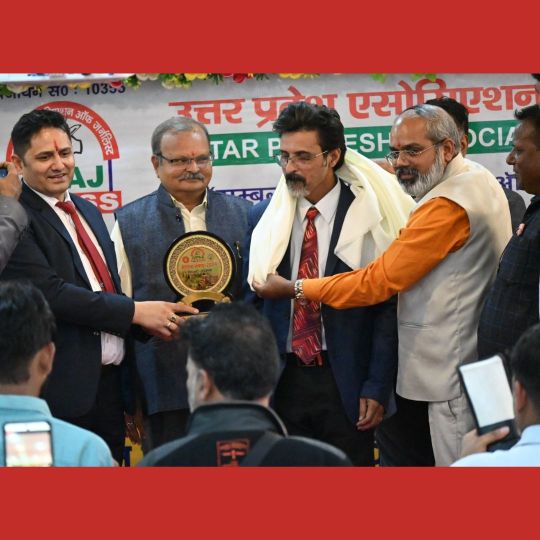

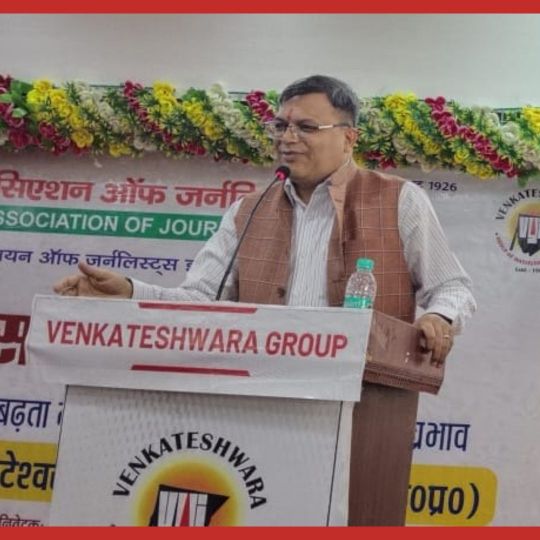
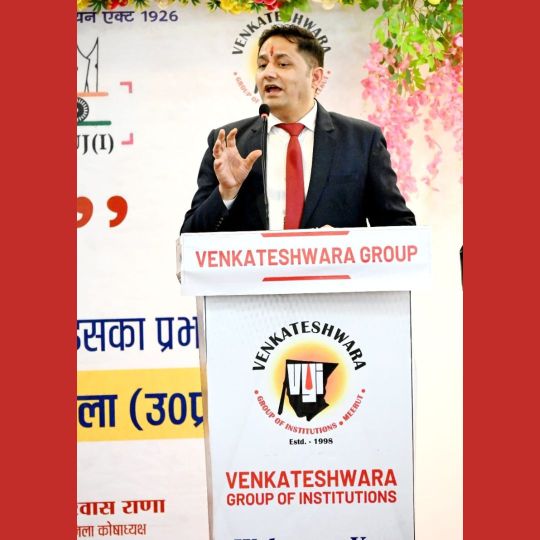
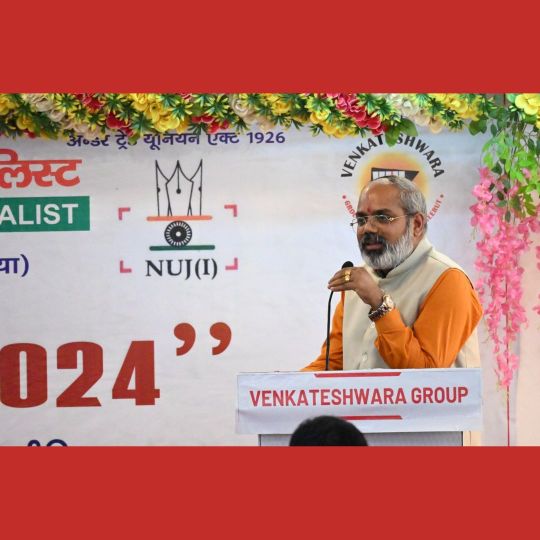
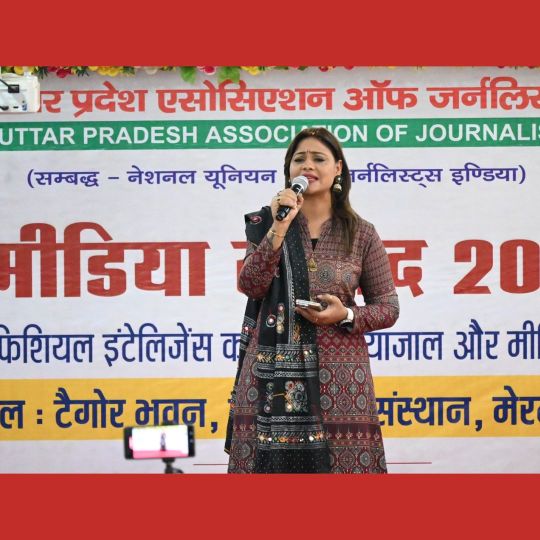
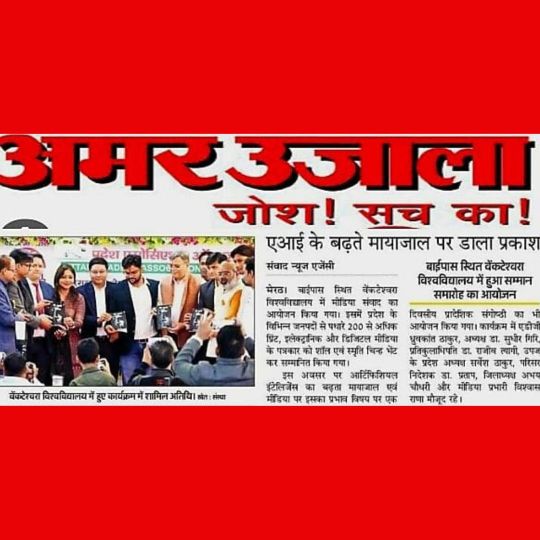

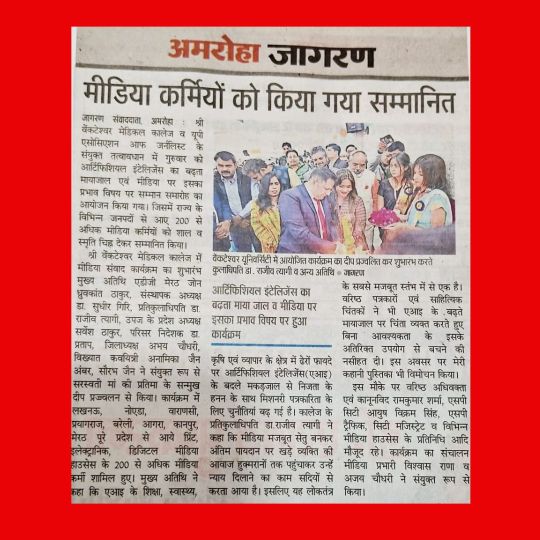

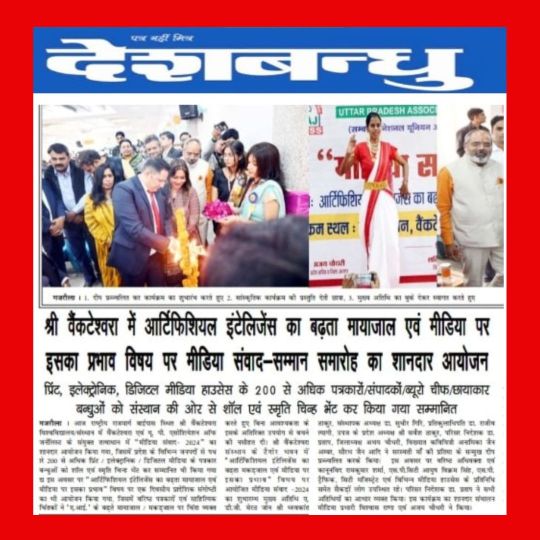
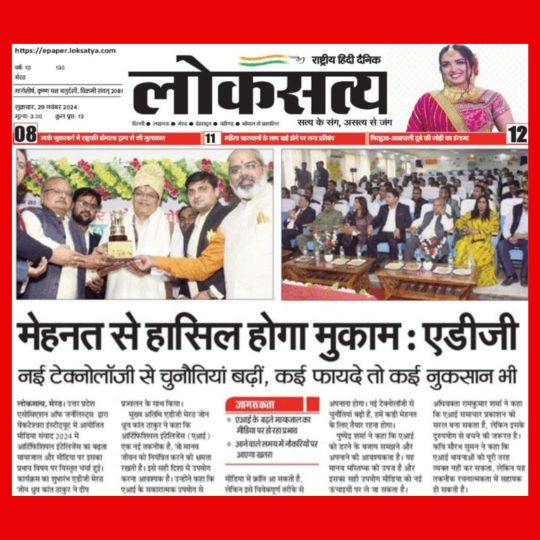




Shri Venkateshwara University/Institute, in collaboration with the UP Association of Journalists, hosted a Media Dialogue 2024 on the growing illusion of artificial intelligence and its effects on media cum felicitation ceremony.
Over 200 print/media/digital journalists representing Lucknow, Noida, Varanasi, Prayagraj, Bareilly, Agra, Kanpur, Meerut & other districts attended the mega event & were felicitated with a shawl & memento.
The Media barons, senior journalists and literary figures advised to avoid the unnecessary/unethical use of AI in order to curb the ill effects of Artificial Intelligence.
The Chief Guest & Meerut Zone ADJ Mr. Dhruvkant Thakur, the Venkateshwara Group Founder President Dr Sudhir Giri, Pro Chancellor Dr Rajeev Tyagi & President UPAJ Mr. Sarvesh Thakur inaugurated the event by lighting a lamp to Goddess Saraswati.
The Campus Director Dr Pratap Singh, District Head Abhay Chaudhary, renowned poet Anamika Jain Amber & Saurabh Jain joined them to unveil the Media Dialogue 2024 on the growing illusion of artificial intelligence and its effects on media.
The CG & Additional Director General of Police Meerut Zone Mr. Dhruvkant Thakur asserted AI offers various benefits in education, healthcare, agriculture & business, but the misuse of AI can lead to privacy invasion and pose serious challenges for journalism.
The Venkateshwara Group Founder President, Dr Sudhir Giri, reiterated the Venkateshwara Group is proud to honour Media - the fourth pillar of democracy.
Mr. Sarvesh Thakur Editor Panchjanya affirmed AI is a wonderful medium to establish instant communication all over the world, but will cause adverse effects on writing, research, & review in journalism.
Pro Chancellor Dr. Rajeev Tyagi highlighted that the media serves as a strong link between the common man and those in power by voicing their concerns to achieve justice. These characteristics make media one of the key pillars of democracy.
Those present included the Senior Advocate & Jurist Mr. Ramkumar Sharma, City SP Mr. Ayush Vikram Singh, SP Traffic, City Magistrate, along with Media House representatives and hundreds of people attended the mega event.
The Campus Director, Dr Pratap Singh, thanked the dignitaries for their gracious presence.
The Media Incharge Mr. Vishwas Rana, along with Mr. Ajay Chaudhary, conducted the program exceedingly well.
0 notes